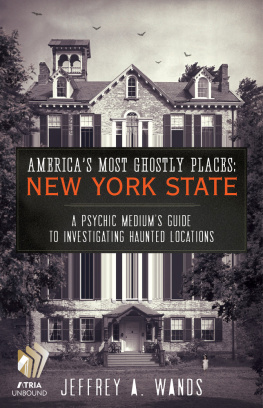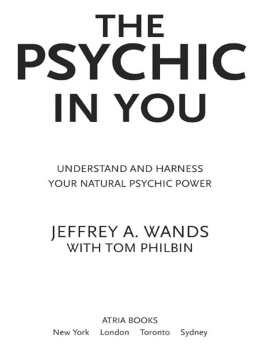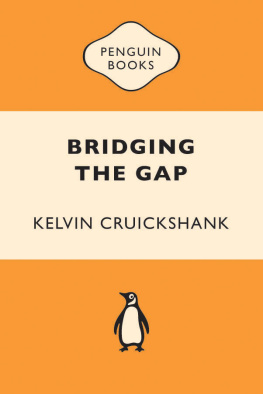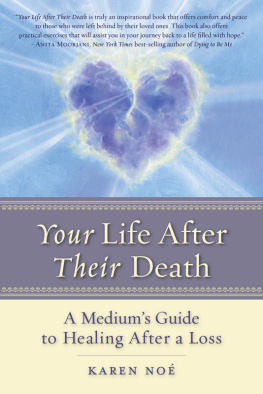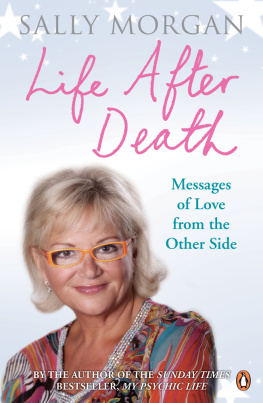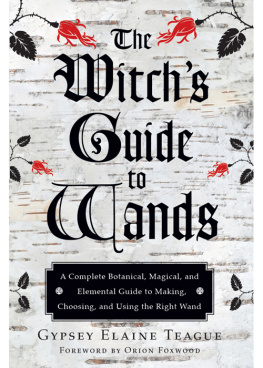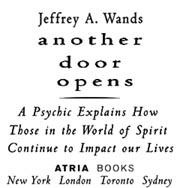Also by Jeffrey A. Wands
Dream Interpretation: A Psychics A to Z Guide to Uncovering the Truth Behind Your Dreams
Americas Most Ghostly Places: New York State: A Psychic Mediums Guide to Investigating Haunted Locations
Knock and the Door Will Open
Another Door Opens
The Psychic in You
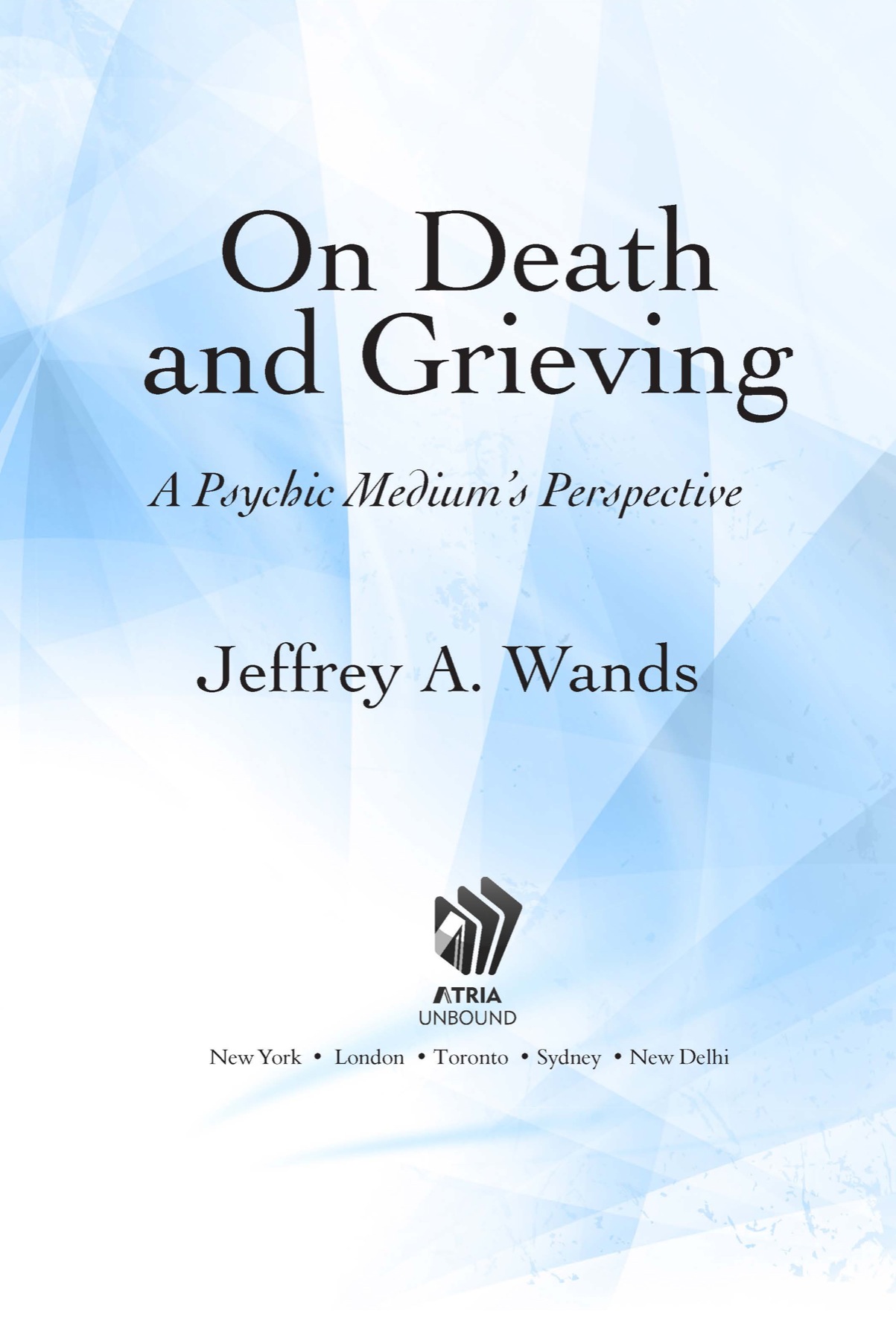
With love to my wife, Dawn, and our boys, Christopher and Robert.
For all those who grieve, I offer healing prayers to mend your hearts.
Contents
Acknowledgments
With sincere gratitude to my clients for the trust you place in me by graciously allowing me to be part of your healing and by sharing your stories. Also, thanks to your loved ones on the other side.
Thank you to all who listen and call in to my radio show on WALK 97.5 FM every Sunday night.
To my editor, Johanna Castillo, whose guidance and input are always appreciated. To Judith Curr, still a visionary. Sincere thanks to Carolyn Reidy and to all those at Atria Books who contribute to making each book a success. Thank you to my agents, Liv and Bill Blumer, and to my writer, Judith Kern.
To Mother Joan, for your endless love and guidance.
With special thanks to my wonderful assistant, Theresa OKelly-Moriarty, who balances my life.
Life is pleasant. Death is peaceful. Its the transition thats troublesome.
Isaac Asimov
Introduction
As I See It
I am a psychic medium, and, as such, my work involves trying to help people come to terms with the death of a loved one, overcome their own fear of death, and resolve any questions or issues they may still have about the one who has died.
I am able to do this because I know that the spirit lives on after the death of the physical body, and I am able to contact and communicate with those in spirit so that I can deliver their messages to their living loved ones.
Of course, there will always be skeptics who doubt my ability to do what I do, and very often, it is religious leaders who are the most vociferous in their condemnation of my work. This confuses, amuses, and often angers me, since virtually all cultures and religions, from the beginning of time, have had some form of belief in an afterlife. The Book of the Dead, for example, the holiest of Egyptian religious texts, provides instructions for funerary practices, prayers, spells, and rituals designed to ensure the survival of the soul. The ancient Egyptians believed that after death, everyone first entered the underworld to be judged and tested in order to determine whether they went on to a state of eternal bliss or to the Egyptian equivalent of hell.
While there are differences in detail among the various Christian sects, one thing upon which all Christians agree is that there is an afterlife and that where we go after we die depends upon how we conducted ourselves while we were alive. To some degree, the same could be said of Buddhists, who believe in karma, a cycle of death and rebirth through which we are meant to increase our spirituality and learn to release our desire for earthly things. The Buddhist goal is to escape the cycle of reincarnation and attain a permanent state of Nirvana.
Although my mother was Jewish, I was raised a Catholic, and many of my own beliefs and rituals are based upon the teachings of the Catholic Church. But I also believe that whatever path anyone follows, all roads lead to the same destinationthe survival of the soul after death.
My psychic understanding of what happens when we die differs from that of most religious or cultural belief systems in that I know from personal experience that those in the spirit world can and do continue to be aware of and communicate with those of us who are still alive.
While various ancient religious texts refer to God or a god appearing on earth at a specific time in order to deliver a particular message to man, none talks about the ability that we each have within us to give and receive messages to and from those who have passed on.
The vast majority of my work as a psychic medium involves helping the living to communicate with the dead. Clients come to me after someone important in their life has passed on, because they feel there is some unfinished business between them. Perhaps the death was sudden and they didnt have a chance to say good-bye. Perhaps the person who is living has caused pain to the one who died (or vice versa), and the survivor wants or needs to give or receive absolution to or from the dead. Or it might simply be that the death of a loved one has left the living in so much pain that he or she needs to be reassured of the souls survival in order to get through the grieving process and move on with life.
My goal in this book is to help you, the reader, make peace with the death of your loved ones. You will see, as you read on, that each death is unique, everyone grieves differently, and the best way to get through our grief after someone dies is to know that he or she lives on in the world of spirit, that our loved one is at peace, and that all he or she wants is for us to be happy and move on with our lives.
Death Is a Process
When people are seriously ill over a period of time, they begin to come to terms with death while they are still living. If they are ill, they often start out hoping or expecting that they will recover. They may think theyre going to beat the disease or condition, or they may hope for a reprieve or a divine miracle. At some point, however, they realize that there wont be any reprieve, theyre not going to get better, and they either become resigned to the situation or they fight against their fate.
Those who fight fate are most often afraid because they dont know what happens when we die, and so they cling desperately to life. I believe that this is often the situation when people lie in a coma and are, in effect, stuck and lingering between life and death. In many cases, however, their fear manifests as anger, and the person who is dying becomes aggressive and nasty to those around him and starts to bring up grievances from the past.
Many of my clients tell me how mean their dad or mom was before he or she passed. When that happens, the survivor often feels guilty and comes to me hoping to receive forgiveness from his or her parent when no forgiveness is necessary. Most often, the parent in spirit then comes through and asks me to reassure their loved one that he or she did nothing wrong and needs to stop blaming himself unnecessarily. As I explain to my clients, acting out is simply the dying persons way of dealing with their fear.
I remember particularly one kind and caring young woman named Christine who had finally become so frustrated by her mothers continual insults that she snapped and said something nasty in response. Then, when her mother died, all she could remember were those nasty words. During our session, she wanted me to tell her mother how sorry she was and that she didnt mean it. I assured her that her mother knew what Christine had been going through and that her outburst didnt reflect who she really was or what she really felt.
The more survivors understand this phenomenon as a natural part of the death process, the easier it will be for them to move on once their loved one has passed. That said, however, not everyone fights the inevitable, and not all caretakers become the targets of their loved ones anxiety-generated anger.
Finding Peace in Passing
Often people who have lived a long life, as well as many who are terminally ill, are able to make peace with the inevitability of death. They may begin to sleep more, and they often mentally review their lives and assess what they have accomplished.
Next page
